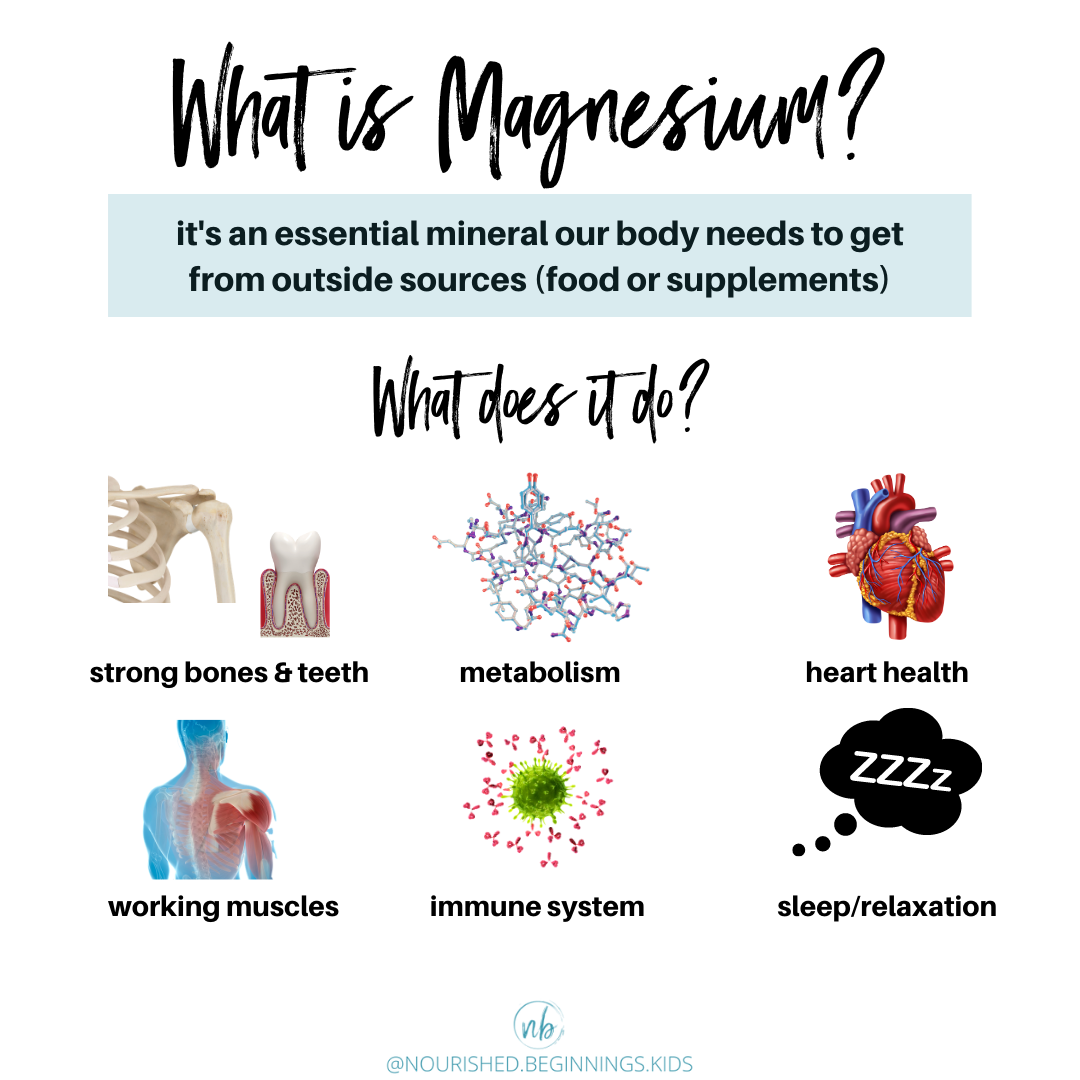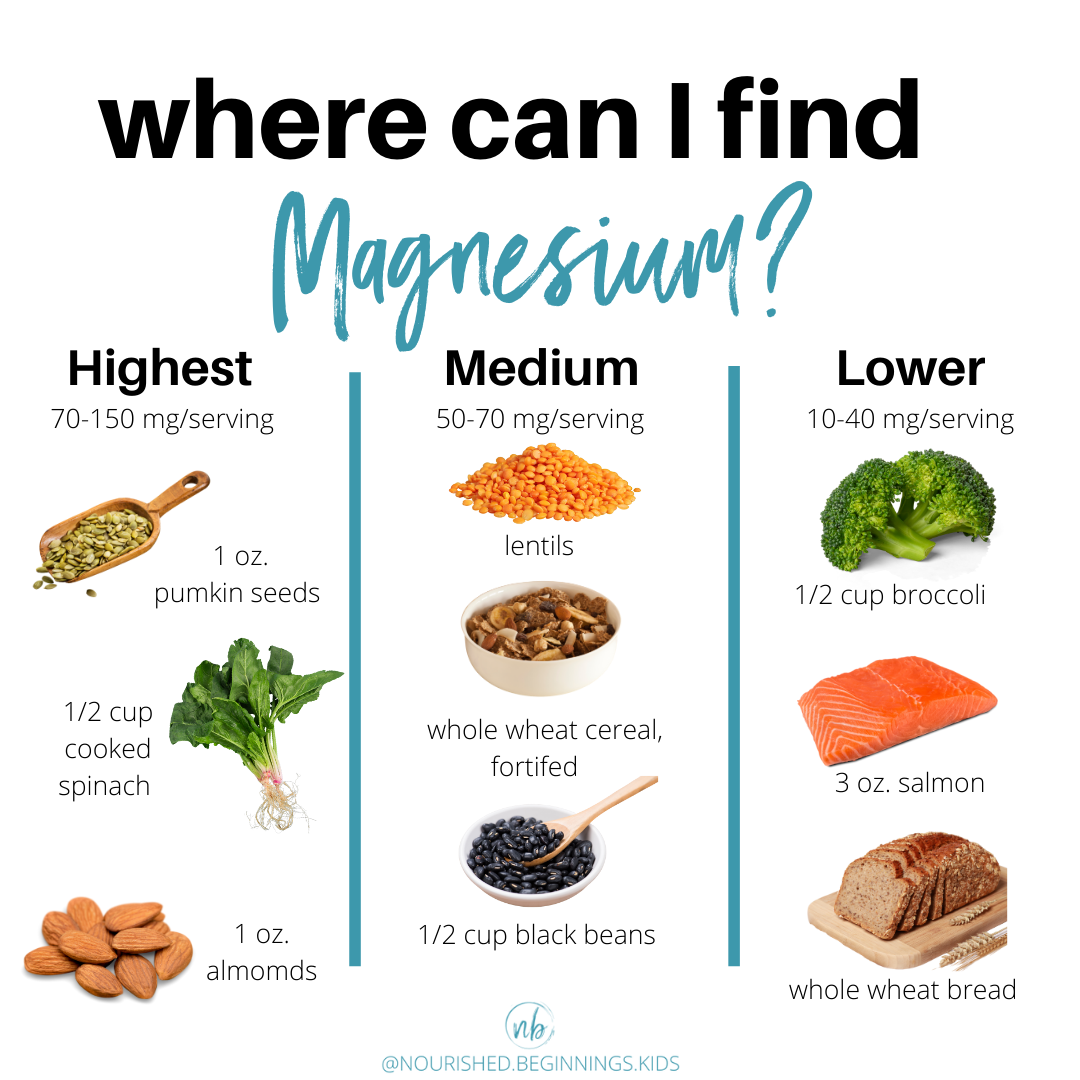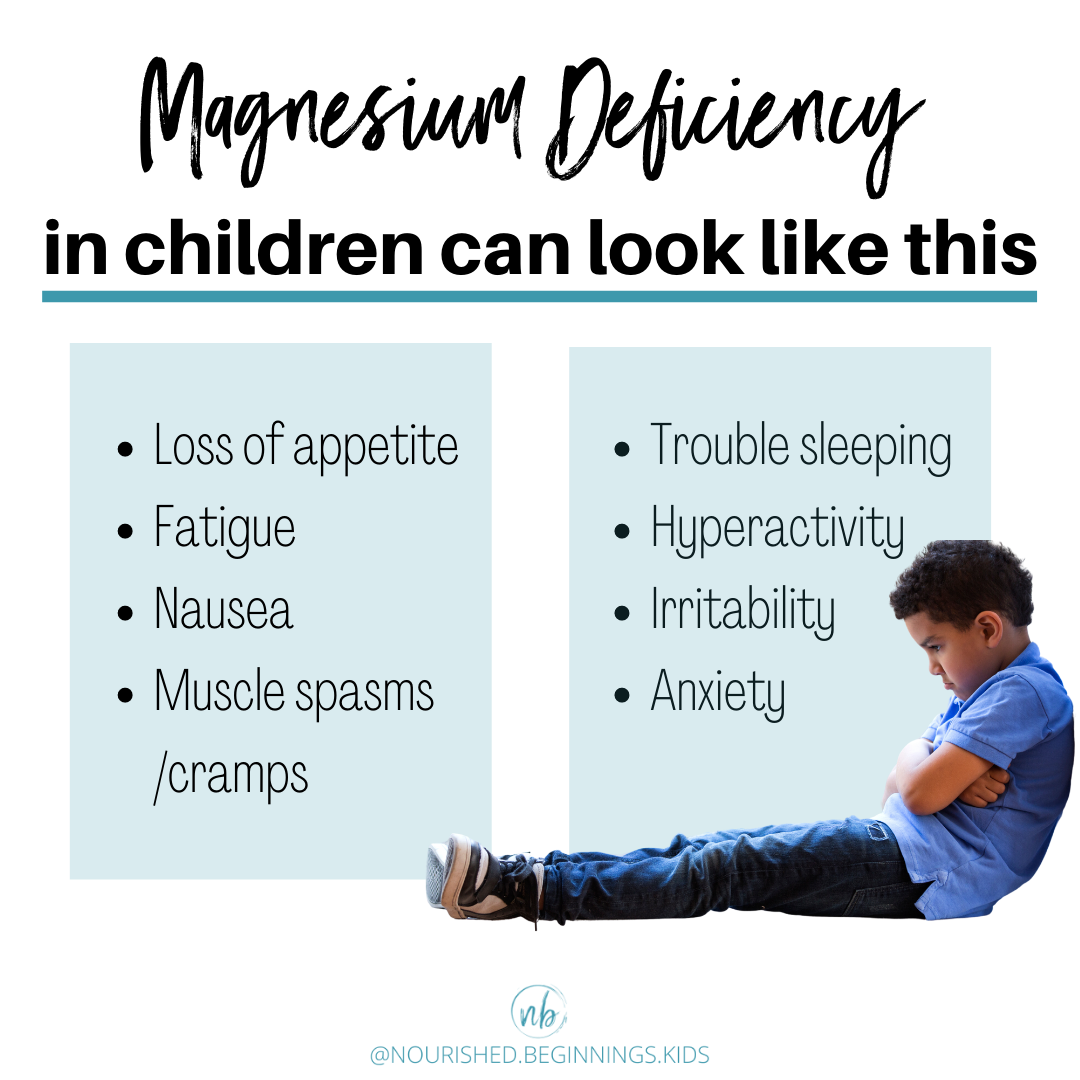What is Magnesium, and why is it important?
Magnesium is considered an essential mineral that your body needs to get from food or supplements. It’s involved in over 300 different chemical reactions that happen in the body. It’s needed for metabolism (allowing your cells to use energy from the carbs kids eat), as well as helping other vitamins and minerals to do their jobs.
Magnesium and calcium work together to make sure your muscles can function properly. Calcium promotes muscle contraction, and magnesium helps muscles properly relax. Magnesium also assists with the activation of Vitamin D and calcium (told you these ones were important!) to help keep your child’s bones nice and strong.
Magnesium is also super important for keeping the heart beating properly, preventing tooth decay, and supporting the immune system when it’s under stress. It has a relaxation factor that even plays a role in promoting and improving sleep (1).
As you can see, different vitamins and minerals work together to make sure the body is at its best! This is why it is so important to make sure your child is getting enough of EACH and every one of them!
So how much does my child need?
Now that we know why magnesium is so important, let’s talk about how much your child actually needs. The amount of magnesium they need depends on their age and sex (recommendations after age 13 vary). These are the average daily recommendations of magnesium in milligrams per day (mg/day).
Infants (0-6 months): 30 mg/day
Infants (7-12 months): 75 mg/day
Children (1-3 years): 80 mg/day
Children (4-8 years): 130 mg/day
Males (9-13 years): 240 mg/day
Females (9-13): 240 mg/day (2)
What foods can I find it in?
The good thing about magnesium is that it’s pretty easy to get enough of from eating a balanced diet (much easier than that tricky Vitamin D!). It’s also common across a range of different foods….
Dark leafy greens: like spinach or kale Ex. Spinach (frozen or cooked) ½ cup: 75 mg
Nuts & seeds: roasted pumpkin seeds (these are an amazing source!), cashews, almonds, peanuts/peanut butter, chia seeds Ex. Dry roasted almonds, 1 oz: 80 mg
Legumes: Soy beans, black beans, kidney beans, lentils, edamame
Whole Grains: bread, fortified breakfast cereals, oats, brown rice
Fatty fish: salmon, halibut
Fruit & veg: bananas, broccoli, carrots, apples (3).
When it comes to your child’s diet, variety is key! The more variety you can get in, the better nourished they will be with all the essential vitamins and minerals.
Symptoms of a Magnesium deficiency
Magnesium deficiency isn’t super common. Our kidneys do a good job at conserving magnesium! However, because more children are commonly eating processed foods, we are seeing deficiencies more often. Foods tend to lose much of their magnesium during processing which is why prioritizing whole foods is SO important.
Deficiency can also occur in those with digestive disorders such as celiac, chronic diarrhea, or type 2 diabetes (4). Early signs of a deficiency include a loss of appetite, nausea, vomiting, fatigue, and weakness. As it becomes more serious, symptoms may include numbness, tingling, muscle contractions or cramps, and extreme symptoms involve irregular heart rhythms and seizures (5).
Yes, deficiency can also impact behaviour!
Other symptoms of magnesium deficiency include moodiness (like irritability or hyperactivity), difficulty concentrating, insomnia, and anxiety (6). Studies have shown higher intakes of magnesium to be associated with improvements in the behaviours above (7).
What if you suspect a magnesium deficiency…
Any of the above symptoms may be a sign to check in with your pediatrician and registered dietitian (RD). Behavioural issues such as ADHD are commonly associated with nutrient deficiencies and may go un/mis-diagnosed (vitamin D and iron are other examples of this). Focusing on the diet is a crucial starting point for many behavioural challenges in kids. You would be surprised by how much you can fix with a balanced diet!
Does my child need a supplement?
While it’s always best to work on a deficiency with diet first, there are times when a magnesium supplement would be beneficial for your child. If they have extreme dietary restrictions that limit food choice, it may be challenging to get enough. Magnesium deficiency also seems to be correlated with ADHD and supplementation has been shown to improve symptoms in these individuals (8). You may also think about a supplement if your child is having difficulty sleeping, showing behavioural issues, or if they struggle with constipation. Reach out to your pediatric registered dietitian or pediatrician for recommendations on your child’s unique needs!
follow us on instragram
Blog Contributor
KENDALL SARAVANAMUTTOO
WESTERN UNIVERSITY STUDENT
HONOURS SPECIALIZATION IN HEALTH SCIENCES
References
Piche, A., Sizer, F., & Whitney, E. (2015). Nutrition: Concepts and converseries. Third Edition. Paul Fam.
Government of Canada (2006, June 29). Dietary reference intakes.
Redondo, P. (2019, August 21). DaVinci Laboratories. Why kids need magnesium.
Harvard Health Publishing (2017, December 17). What you should know about magnesium. Harvard Medical School.
National Institute of Health (2020, September 25). Magnesium.
Greenblatt, J. (2017, April 17). Integrative treatment for behavioural problems in children. The Great Plains Labratory, Inc.
Black, L. J., Allen, K. L., Jacoby, P., Trapp, G. S., Gallagher, C. M., Byrne, S. M., & Oddy, W. H. (2015). Low dietary intake of magnesium is associated with increased externalising behaviours in adolescents. Public health nutrition, 18(10), 1824–1830.
Baza, F., Ahmed, H., Shahaw, A., Zahra, S., Ahmed, R., & Hakim, A. (2016). Magnesium supplementation in children with attention deficit hyperactivity disorder. Science Direct, 17(1), 63-70.










